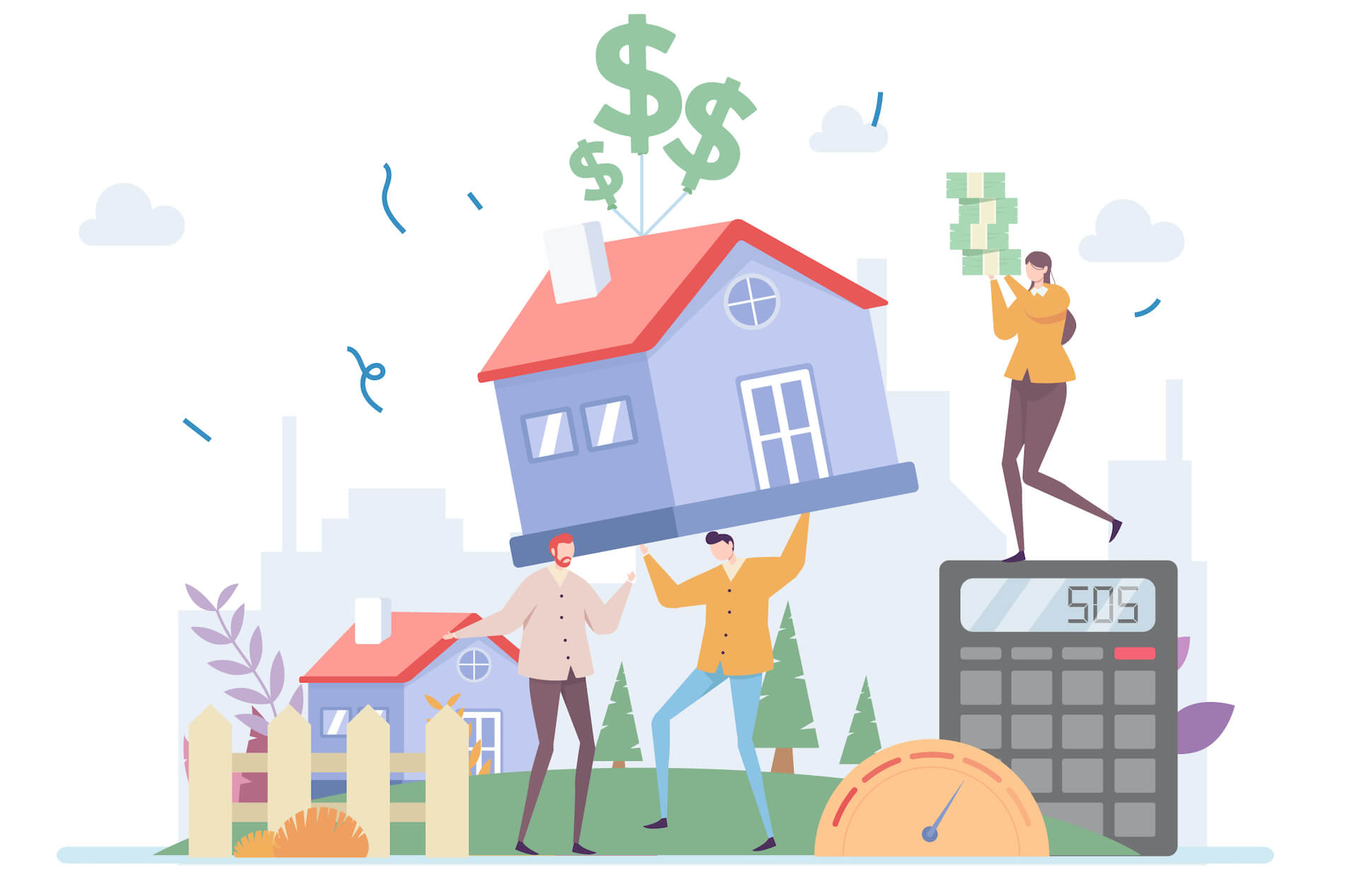If you’ve paid attention to the news in the last year or so, you’ve probably heard a fair amount about mortgage refinancing.
Should you refinance your mortgage?
In July, CNBC proclaimed that eight million homeowners were leaving cash on the table by not refinancing. In December, the publication noted that weekly refinance rates were up 314% from a year earlier.
Even if you previously had no plans to refinance your mortgage, you may have started wondering whether doing so would save you money. If you’re still wondering, you’re in the right place. You'll learn:
- What mortgage refinance loans are and how they work.
- When it may make sense to refinance a mortgage.
- How to actually go about refinancing your home.
Read on for details.
What are refinanced loans & how do they work?
A refinance loan is a type of mortgage loan. It replaces the original mortgage you took on to pay for your house. You take out the refinance loan to pay off the original loan, then make mortgage payments to the lender who originated your refinance mortgage.
As the name of the loan implies, homeowners often take on refinance loans when they want to rework the financial terms of their mortgage – often so they can save money in some capacity.
It’s common for homeowners to refinance in order to:
- Lower their interest rate, meaning they’ll pay less in interest over the life of the loan.
- Reduce their monthly payments, even if it means paying more interest over the life of the loan.
- Use some of the equity they’ve built up in their home. This is called a “cash-out refinance.”
- Eliminate their mortgage insurance.
- Pay off the loan faster, often meaning they’ll have higher monthly payments but will pay less in interest over the life of the loan
- Achieve greater cost stability by switching from an adjustable-rate mortgage to a fixed-rate mortgage.
And because refinance loans are themselves a type of mortgage loan, homeowners have to go through roughly the same process to get them as they do with an original mortgage. Notably, this means you have to qualify for the loan itself and that you have to pay certain associated costs (including a home appraisal and closing fees).
Because of those two factors, a mortgage refinance isn’t right for everyone. To get an idea of whether refinancing your mortgage can improve your financial situation, let’s take a look at when refinancing typically makes financial sense.
When you refinance your mortgage, you have to pay for a home appraisal and closing fees.
When it makes sense to refinance your mortgage

The goal of refinancing a mortgage loan is typically to save money in some way, either on your monthly payments or on the overall cost of your loan (as outlined above).
For individual homeowners, there are a few common triggers that indicate that it’s a good time to research whether taking on a refinancing loan makes financial sense, including these:
- Interest rates fall below what you’re currently paying. That’s what happened in 2019, when you likely saw dozens of headlines about how much homeowners were saving thanks to the refinance boom.
- Your credit improves. When it does, you may qualify for a loan with more favorable terms than the one you currently have. If this happens, it may make sense to refinance even if interest rates haven’t changed much.
- You’ve built enough equity to ditch your mortgage insurance. Once you have 20% equity in your home, you may qualify to eliminate your mortgage insurance. Doing so in a refinance could reduce your monthly payments.
But these triggering incidents are only part of the equation. Because refinancing a mortgage isn’t free (experts note that it usually costs between 3% and 6% of your loan’s principal), it’s important to run the numbers before leaping headlong into a refinance loan.
There are a few numbers you might want to consider as you evaluate the potential benefits a refinance could bring you:
- Break-even point: This calculation weighs the money you pay to get your refinanced mortgage against the money you’ll save thanks to your new interest rate. How long will it take you, based on what you save on monthly payments, to recover what you spent on the new loan? Generally, the faster you hit your break-even point, the better. If the break-even point is too far in the future, it’s possible that the money you’d spend on getting the new mortgage would serve you better elsewhere – say, earning interest in an investment account.
- Total savings: This number looks at the total amount you’ll save over the life of your refinanced loan. If you have the potential to significantly reduce your interest rate, this may be a useful metric to use.
- Monthly savings: Maybe your financial circumstances have changed and your main goal is to reduce your monthly expenses, even if that means paying more in interest over the life of your loan. In that case, you may want to consider how much money you’d save each month with your new loan terms.
Notice we haven’t offered any definitive guidelines here on when a homeowner should refinance a mortgage. That’s because everyone’s situation is different and may be affected by a number of variables, including:
- Your credit score.
- Your original interest rate and the rate currently available to you.
- Equity you have in the home.
- Your larger financial strategy and goals.
Because of this, it’s also possible that refinancing your mortgage could end up costing you more than the original loan. We really can’t emphasize enough how important it is to run the numbers for your particular case.
The easiest way to do this is to use a refinancing calculator. Nerdwallet and Bankrate both offer free, easy-to-use options.
How to refinance your mortgage
If you’ve run the numbers and determined that refinancing your mortgage makes financial sense, it’s time to start the actual process. First, decide which of the following is your goal for refinancing:
- Pay less in interest over the life of the loan: For this, you’ll probably want to lower your interest rates without lengthening your current payoff schedule.
- Lower monthly payments: For this, you may want lower interest rates and a longer payoff schedule (e.g., by refinancing into a new 30-year mortgage).
- Tap into equity: For this, you’ll want a “cash-out” refinance.
- Eliminate mortgage insurance: For this, you’ll have to have at least 20% equity in your home.
- Reduce the length of the loan: For this, you’ll want to refinance into a loan with a shorter time horizon than your current payoff schedule.
- Get into a more stable loan: For this, you’ll want to refinance into a fixed-rate loan.
Once you’ve defined your goal, do some online research to figure out what interest rates currently are. Then do some ballpark calculations: plug your numbers into an online refinance calculator to see what kind of savings you can expect.
If the initial numbers look good, it’s time to get in touch with lenders. It’s best to compare offers from three to five lenders to ensure you’re getting the best deal. As you do this:
- Apply within a two-week period to minimize the impact on your credit score.
- Ask for their rates for the loan type you want (e.g., fixed-rate, 15-year, etc.).
They’ll get back to you with loan estimates (including closing costs). Use these numbers to run your refinance calculations again.
If everything still looks good, it’s time to go with the lender who offered you the most attractive deal and ask to “lock” your interest rate. Locking guarantees the rate for a set number of days, during which time you and your lender can try to close the loan.
This part of the process should remind you of getting your original mortgage, because it’s roughly the same – except you won’t be moving into a new house when you’re finished. At this point, that’s probably a big relief!
Closing thoughts on refinancing your mortgage
If you’ve never refinanced a mortgage, the process can be intimidating. It’s a major financial decision and you may feel like you’re on your own to make it.
In reality, though, your lender should be motivated to help you. Lenders make money on mortgage refinances, so it’s in their best interest to help borrowers determine whether refinancing makes sense.
And don’t be surprised if your lender doesn’t reach out to you proactively about refinancing opportunities available to you. Even though most banks and lenders have a lot of data on their customers, few have effective systems for effectively tracking when those customers might benefit from various financial products.
The bottom line: refinancing a mortgage can lead to significant savings for some homeowners. If you’re curious about whether you should refinance, play around with some online calculators to get an initial idea of how the numbers add up for you.
Keep in mind, though: refinancing a mortgage does not make sense in every situation. It’s important to do your homework to make sure you end up in a loan that works with your long-term financial goals.


